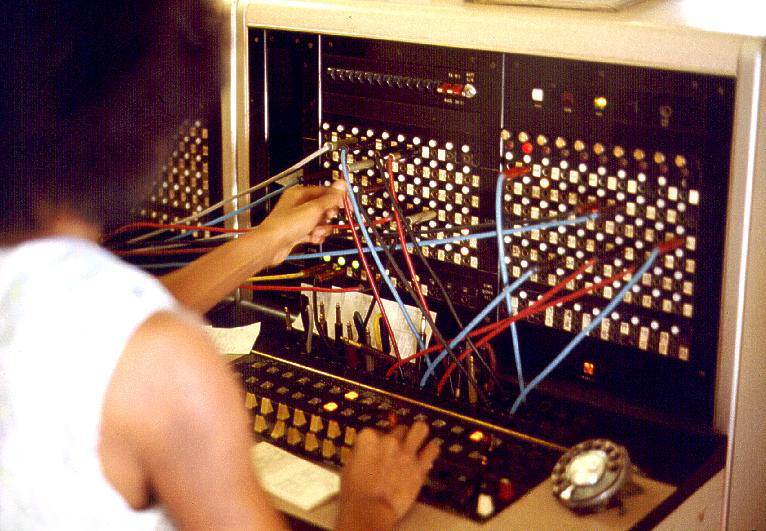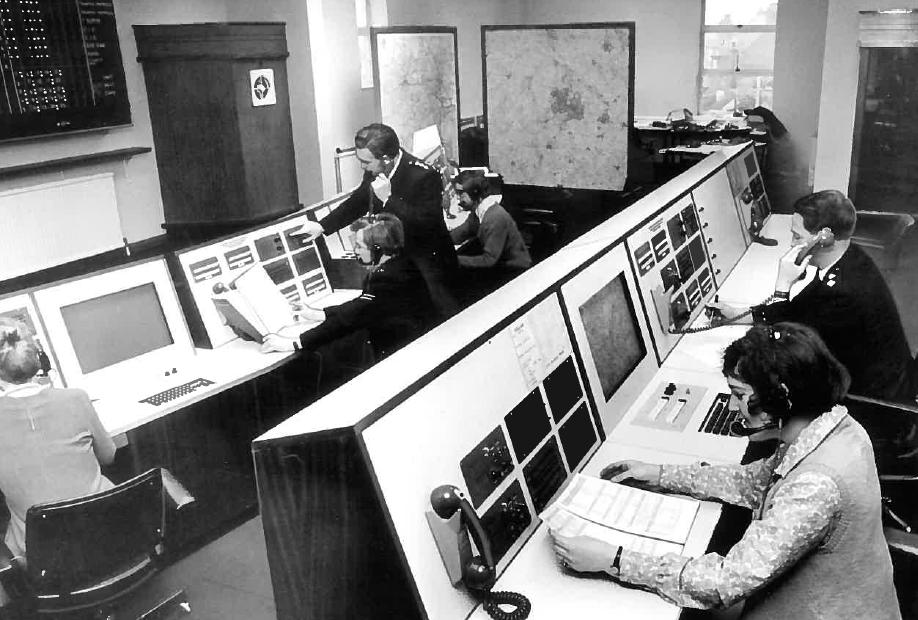|
Night Service (telephony)
Night service in telephony is a feature of private branch exchanges and other business telephone systems, whereby for a set period during the day (usually those hours outside of normal office or work hours, when normal operator services are not provided), all incoming calls are automatically redirected by the switchboard to a specific extension or to equipment such as an answering machine or other voice mail system. In systems without direct inward dial capability, all calls for a large organisation originally were placed to the facility's main number, where a switchboard operator or attendant would ask which extension or department the caller intended to reach. The call would then be transferred manually. As soon as the front office closed for the day, the system would be unusable for inbound calls. Night service would redirect after-hours calls to a desk where personnel remained on duty overnight, such as a night watchman's duty station or a commercial answering service. An auto ... [...More Info...] [...Related Items...] OR: [Wikipedia] [Google] [Baidu] |
Private Branch Exchange
A business telephone system is a multiline telephone system typically used in business environments, encompassing systems ranging in technology from the key telephone system (KTS) to the private branch exchange (PBX). A business telephone system differs from an installation of several telephones with multiple central office (CO) lines in that the CO lines used are directly controllable in key telephone systems from multiple telephone stations, and that such a system often provides additional features related to call handling. Business telephone systems are often broadly classified into key telephone systems, and private branch exchanges, but many hybrid systems exist. A key telephone system was originally distinguished from a private branch exchange in that it did not require an operator or attendant at the switchboard to establish connections between the central office trunks and stations, or between stations. Technologically, private branch exchanges share lineage with centra ... [...More Info...] [...Related Items...] OR: [Wikipedia] [Google] [Baidu] |
Telephone Switchboard
A telephone switchboard was a device used to connect circuits of telephones to establish telephone calls between users or other switchboards, throughout the 20th century. The switchboard was an essential component of a manual telephone exchange, and was operated by switchboard operators who used electrical cords or switches to establish the connections. The electromechanical automatic telephone exchange, invented by Almon Strowger in 1888, gradually replaced manual switchboards in central telephone exchanges around the world. In 1919, the Bell System in Canada also adopted automatic switching as its future technology, after years of reliance on manual systems. Nevertheless, many manual branch exchanges remained operational into the second half of the 20th century in many enterprises. Later electronic devices and computer technology gave the operator access to an abundance of features. A private branch exchange (PBX) in a business usually has an attendant console, or an auto-atten ... [...More Info...] [...Related Items...] OR: [Wikipedia] [Google] [Baidu] |
Answering Machine
An answering machine, answerphone or message machine, also known as telephone messaging machine (or TAM) in the UK and some Commonwealth countries, ansaphone or ansafone (from a trade name), or telephone answering device (TAD), was used for answering telephones and recording callers' messages. If a phone rings a number of times predetermined by the phone's owner, and nobody is present to answer the incoming call, the answering machine will activate and play either a generic announcement or the voice of the person being called announcing that nobody is able to come to the phone at the moment. Following the announcement is a beeping tone which prompts the caller to record a message after the tone concludes. Unlike voicemail, which can be a centralized or networked system that covers, and mostly extends, similar functions, an answering machine is set up in the user's premises alongside—or incorporated within—the user's land-line telephone. Unlike operator messaging, the ca ... [...More Info...] [...Related Items...] OR: [Wikipedia] [Google] [Baidu] |
Voice Mail
A voicemail system (also known as voice message or voice bank) is a computer-based system that allows users and subscribers to exchange personal voice messages; to select and deliver voice information; and to process transactions relating to individuals, organizations, products, and services, using an ordinary phone. The term is also used more broadly to denote any system of conveying a stored telecommunications voice messages, including using an answering machine. Most cell phone services offer voicemail as a basic feature; many corporate private branch exchanges include versatile internal voice-messaging services, and *98 vertical service code subscription is available to most individual and small business landline subscribers (in the US). History The term ''Voicemail'' was coined by Televoice International (later Voicemail International, or VMI) for their introduction of the first US-wide Voicemail service in 1980. Although VMI trademarked the term, it eventually became a ge ... [...More Info...] [...Related Items...] OR: [Wikipedia] [Google] [Baidu] |
Direct Inward Dial
Direct inward dialing (DID), also called direct dial-in (DDI) in Europe and Oceania, is a telecommunication service offered by telephone companies to subscribers who operate a private branch exchange (PBX) system. The feature provides service for multiple telephone numbers over one or more analog or digital physical circuits to the PBX, and transmits the dialed telephone number to the PBX so that a PBX extension is directly accessible for an outside caller, possibly by-passing an auto-attendant. Plain old telephone service For direct inward dialing service, the telephone company provides one or more trunk lines to the customer for connection to the customer's PBX, and allocates a range of telephone numbers to the customer. Calls to such numbers are forwarded to the customer's PBX via the trunks. As calls are presented to the PBX, the dialed telephone number is signaled to the PBX with Dialed Number Identification Service (DNIS) using a prearranged, usually partial format, e.g., t ... [...More Info...] [...Related Items...] OR: [Wikipedia] [Google] [Baidu] |
Switchboard Operator
In the early days of telephony, companies used manual telephone switchboards, and switchboard operators connected calls by inserting a pair of phone plugs into the appropriate jacks. They were gradually phased out and replaced by automated systems, first those allowing direct dialing within a local area, then for long-distance and international direct dialing. Description A typical telephone switchboard has a vertical panel containing an array of jacks with a desk in front. The desk has a row of switches and two rows of plugs attached to cables that retract into the desk when not in use. Each pair of plugs was part of a cord circuit with a switch associated that let the operator participate in the call or ring the circuit for an incoming call. Each jack had a light above it that lit when the customer's telephone receiver was lifted (the earliest systems required the customer to hand-crank a magneto to alert the central office and, later, to "ring off" the completed call). Lines ... [...More Info...] [...Related Items...] OR: [Wikipedia] [Google] [Baidu] |
Security Guard
A security guard (also known as a security inspector, security officer, or protective agent) is a person employed by a government or private party to protect the employing party's assets (property, people, equipment, money, etc.) from a variety of hazards (such as criminal activity, waste, damaged property, unsafe worker behavior, etc.) by enforcing preventative measures. Security guards do this by maintaining a high-visibility presence to deter illegal and inappropriate actions, looking (either directly, through patrols, or indirectly, by monitoring alarm, alarm systems or closed-circuit television, video surveillance cameras) for signs of crime or other hazards (such as a fire), taking action to minimize damage (such as warning and escorting trespassers off property), and reporting any incidents to their clients and emergency services (such as the police or paramedics), as appropriate. Security officers are generally uniformed to represent their lawful authority to protect priv ... [...More Info...] [...Related Items...] OR: [Wikipedia] [Google] [Baidu] |
Answering Service
A call centre ( Commonwealth spelling) or call center (American spelling; see spelling differences) is a managed capability that can be centralised or remote that is used for receiving or transmitting a large volume of enquiries by telephone. An inbound call centre is operated by a company to administer incoming product or service support or information enquiries from consumers. Outbound call centres are usually operated for sales purposes such as telemarketing, for solicitation of charitable or political donations, debt collection, market research, emergency notifications, and urgent/critical needs blood banks. A contact centre is a further extension to call centres telephony based capabilities, administers centralised handling of individual communications, including letters, faxes, live support software, social media, instant message, and email. A call center was previously seen to be an open workspace for call center agents, with workstations that include a computer and di ... [...More Info...] [...Related Items...] OR: [Wikipedia] [Google] [Baidu] |
Automated Attendant
In telephony, an automated attendant (also auto attendant, auto-attendant, autoattendant, automatic phone menus, AA, or virtual receptionist) allows callers to be automatically transferred to an extension without the intervention of an operator/receptionist. Many AAs will also offer a simple menu system ("for sales, press 1, for service, press 2," etc.). An auto attendant may also allow a caller to reach a live operator by dialing a number, usually "0". Typically the auto attendant is included in a business's phone system such as a PBX, but some services allow businesses to use an AA without such a system. Modern AA services (which now overlap with more complicated interactive voice response or IVR systems) can route calls to mobile phones, VoIP virtual phones, other AAs/IVRs, or other locations using traditional land-line phones or voice message machines. Feature description Telephone callers will recognize an automated attendant system as one that greets calls incoming to ... [...More Info...] [...Related Items...] OR: [Wikipedia] [Google] [Baidu] |
Services Marketing
Services marketing is a specialized branch of marketing which emerged as a separate field of study in the early 1980s, following the recognition that the unique characteristics of services required different strategies compared with the marketing of physical goods. Services marketing typically refers to both business to consumer (B2C) and business-to-business (B2B) services, and includes marketing of services such as telecommunications services, financial services, all types of hospitality, tourism leisure and entertainment services, car rental services, health care services and professional services and trade services. Service marketers often use an expanded marketing mix which consists of the seven Ps: product, price, place, promotion, people, physical evidence and process. A contemporary approach, known as ''service-dominant logic'', argues that the demarcation between products and services that persisted throughout the 20th century was artificial and has obscured that everyon ... [...More Info...] [...Related Items...] OR: [Wikipedia] [Google] [Baidu] |






